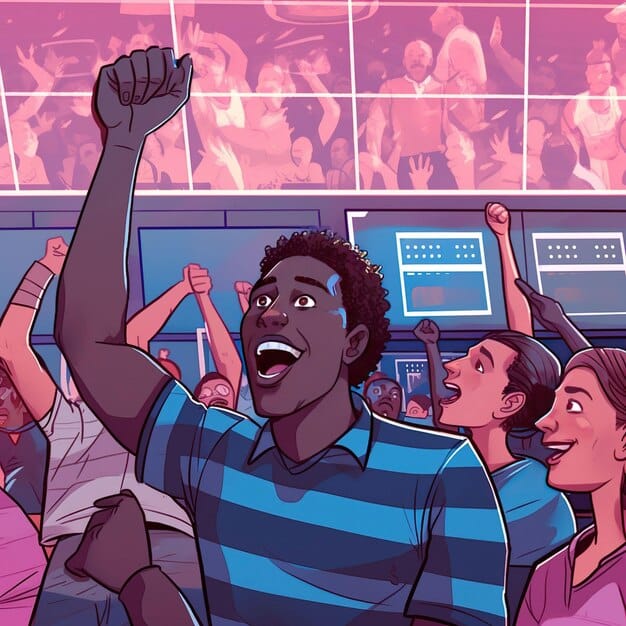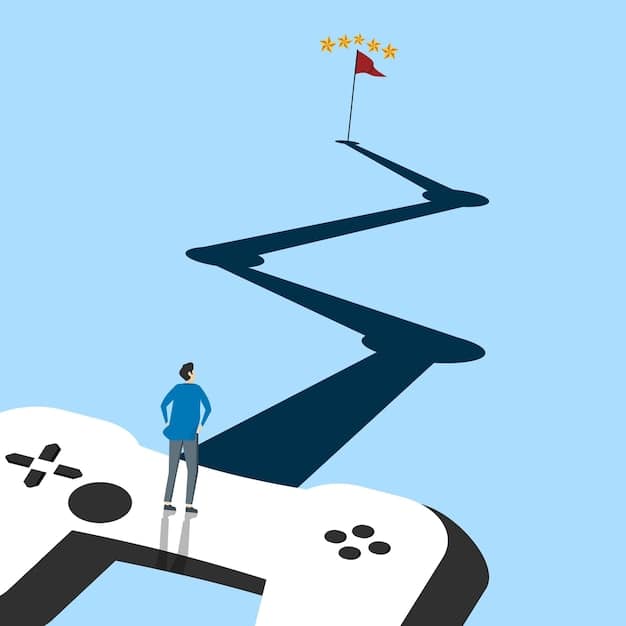Esports Unionization: Will a US Players’ Union Improve Conditions?

Esports unionization efforts in the US aim to address concerns over working conditions and salaries for professional gamers, potentially leading to standardized contracts, better benefits, and increased player bargaining power within the growing esports industry.
The evolving landscape of esports has sparked conversations about player welfare. Esports unionization efforts: Will the formation of a players’ union in the US lead to better working conditions and higher salaries? is a question at the forefront as players seek improved support and fair treatment in this booming industry.
The Rise of Esports and the Need for Player Advocacy
Esports has exploded in popularity, becoming a multi-billion dollar industry. However, this rapid growth has also exposed vulnerabilities for professional players, highlighting the necessity for structured player advocacy and representation.
The Burgeoning Esports Industry
The esports industry’s growth is undeniable. With millions of viewers and significant investments from sponsors, understanding the impact of player welfare is paramount and esports is continuously proving itself as a staple industry.
The industry’s continued growth underscores the importance of addressing player welfare and rights within its rapidly evolving ecosystem.
- 💰 Revenue Growth: Esports market revenues have seen exponential increases, driven by sponsorships, advertising, and media rights.
- 📺 Viewership Numbers: The industry boasts impressive viewership figures, rivaling traditional sports events and attracting a diverse audience.
- 🎮 Investment Surge: Investment in esports teams, infrastructure, and leagues continues to rise, reflecting confidence in the industry’s long-term potential.
- 🌎 Global Impact: Esports has become a global phenomenon, transcending geographical boundaries and cultural differences.
The esports industry is booming, but without consistent protections for the players, where will it lead?
Key Concerns of Esports Players
Players face a unique set of challenges, from short career spans to intense pressure and lack of standard contracts. These concerns highlight the necessity of player agency and structured support systems, addressing the unique demands of pursuing a career for esports athletes.

Esports players are often exposed to many issues that could be solved with some form of formalized policy.
Job Security and Contractual Issues
Many esports players are hired under contracts that are subject to change. There are loopholes and no clear legal course in many scenarios.
Health and Wellness
The lack of regulated breaks and healthy standards for hydration and exercise can lead to several health risks that esports players face. Standardized health guidelines is a major concern for players going into the industry.
Addressing these key concerns is paramount for ensuring the well-being and longevity of esports careers. Standardized contracts, health and wellness programs, and fair working conditions are vital for fostering a sustainable and equitable industry.
Unionization: A Potential Solution?
Unionization could provide players with a collective voice to negotiate for better terms and conditions. This is not a new concept and has been explored in other sports. Many believe this could be a positive change for players in general.
Is unionization the answer for the esports community?
A structured union could give the players the leverage needed to voice their concerns about the current ecosystem of the esports industry. A formal collective bargaining strategy could dramatically improve outcomes.
- ⚖️ Collective Bargaining: A union would enable players to negotiate collectively with team owners and tournament organizers, ensuring fair treatment and equitable compensation.
- 🛡️ Legal Protection: Unionization would provide players with legal resources and representation to address breaches of contract, disputes, and other legal issues.
- 💪 Player Empowerment: A union would empower players to advocate for their rights, fostering a more balanced and just relationship between players and organizations.
Many believe that unionization could potentially make all of this possible for esports players.
The Path to Forming a Players’ Union in the US
Organizing a union involves several steps, from garnering support to navigating legal frameworks. The journey to forming a players union is an arduous one involving many phases.

These various steps require time, coordination and financial support.
Building Player Support
Identifying key players, establishing trust, and creating a unified front is a pivotal step during the early stages of unionization.
Legal and Logistical Challenges
Understanding labor laws, complying with regulations, and establishing a sustainable organizational structure is fundamental to a successful union.
Successfully navigating these challenges requires collaboration, strategic planning, and a deep understanding of the esports ecosystem.
Potential Impact on Working Conditions and Salaries
If successful, a union could lead to significant improvements in player contracts, benefits, and overall compensation. These protections would offer more benefits.
A formal union could dramatically change the current esports landscape in ways many hope for.
Improved working conditions and fair salaries are central to fostering a sustainable esports ecosystem. Equitable contracts, health benefits, and grievance procedures contribute to player satisfaction, retention, and overall industry growth.
- 📈 Salary Increases: A union could negotiate for higher minimum salaries, revenue sharing agreements, and performance-based bonuses, ensuring that players are adequately compensated for their skills.
- 🏥 Enhanced Benefits: A union could advocate for health insurance, retirement plans, and other essential benefits, promoting player well-being and financial security.
- ⚖️ Contract Standardization: A union could establish standardized contract terms and conditions, protecting players from unfair clauses and exploitation.
Formalized support and compensation could have a very positive effect if handled correctly.
The Future of Esports Unionization
The push for unionization represents a significant turning point for the esports industry. Whether it succeeds or not, it reflects growing awareness of economic support needs and working conditions, shaping the trajectory of esports for years to come.
Many players hope that unionization will make for a more sustainable and player driven industry.
The esports industry stands at a crossroads, with player welfare and rights emerging as critical considerations. As esports continues to mature, stakeholders must collaborate to create an ecosystem that balances growth with fairness, ensuring the long-term success and sustainability of the industry.
| Key Point | Brief Description |
|---|---|
| 🤝 Collective Bargaining | Players negotiate terms together. |
| 🩺 Health Benefits | Access to healthcare improves wellness. |
| 🛡️ Legal Protection | Ensures player rights are defended. |
| 💰 Higher Salaries | Better pay for professional gamers. |
FAQ
▼
Esports unionization is the process of forming a labor union to represent professional esports players, advocating for better working conditions, salaries, and benefits.
▼
Esports players are considering unionizing to address concerns about fair contracts, health and wellness support, job security, and overall working conditions in the industry.
▼
A union could potentially provide esports players with benefits such as collective bargaining power, legal protection, standardized contracts, health insurance, retirement plans, and higher salaries.
▼
Challenges include garnering player support, navigating complex labor laws, securing recognition from esports organizations, addressing unique aspects of the gaming industry, and coordinating across different games.
▼
Unionization could impact esports teams and organizations by requiring them to negotiate with a player union, adhere to standardized contracts, provide enhanced benefits, and potentially increase player-related expenses.
Conclusion
The discussion around esports unionization highlights a pivotal moment in the industry’s evolution. As players seek better working conditions and greater security, the potential formation of a union in the US could significantly reshape the landscape, leading to improved standards and a more equitable environment for professional gamers.